Is Jesus the Messiah?

Jesus is the most famous Jewish teacher in the entire world. But he was much more than a teacher. He actually claimed to be the rightful king of the entire planet.
In the earliest biography of his life, Jesus says of himself:
“and you will see the Son of Man seated at the right hand of Power, and coming with the clouds of heaven.” (Mark 14:62b)
There’s only one place in the Jewish Scriptures that use language like this. The prophet Daniel writes:
I saw in the night visions, and behold, with the clouds of heaven there came one like a son of man, and he came to the Ancient of Days and was presented before him. And to him was given dominion and glory and a kingdom, that all peoples, nations, and languages should serve him; his dominion is an everlasting dominion, which shall not pass away, and his kingdom one that shall not be destroyed. (Daniel 7:13-14)

When Jesus calls himself the “Son of Man,” he is claiming to be the Messiah, predicted throughout the Hebrew Scriptures. This person is a ruler from the dynasty of the ancient Israeli King David. This king would defeat Israel’s enemies and forever rule the entire world in peace and righteousness.
When Jesus began his ministry as a Jewish Rabbi, he started by preaching about how the “kingdom of God,” was finally at hand.
Now after John was arrested, Jesus came into Galilee, proclaiming the gospel of God, and saying, “The time is fulfilled, and the kingdom of God is at hand; repent and believe in the gospel.” (Mark 1:14-15)
This preaching of the gospel, or good news, of the kingdom was predicted in the Jewish Scriptures. The prophet Isaiah writes:
How beautiful upon the mountains are the feet of him who brings good news, who publishes peace, who brings good news of happiness, who publishes salvation, who says to Zion, “Your God reigns.” (Isaiah 52:7)
As a demonstration that the kingdom of God was starting, Jesus went around healing people and casting out demons. When describing his ministry, he says:
the blind receive their sight and the lame walk, lepers are cleansed and the deaf hear, and the dead are raised up, and the poor have good news preached to them. (Matthew 11:5)
This is very similar to how the Isaiah describes what the world will be like in the end times, when God finally restores everything:
Then the eyes of the blind shall be opened, and the ears of the deaf unstopped; then shall the lame man leap like a deer, and the tongue of the mute sing for joy. (Isaiah 35:5-6)
The earliest followers of Jesus believed that their prophesied king had finally arrived. They believed that this man would finally end the Roman occupation of Israel. After this, Jesus would rule the whole world in an everlasting Golden Age.
Yet their end times theory about Jesus came to a horrifying end one Friday afternoon. The religious elites of that time hated Jesus. As a result, they arrested him in the middle of the night. Then after an illegal trial, they handed him over to the Romans, to be executed by crucifixion.
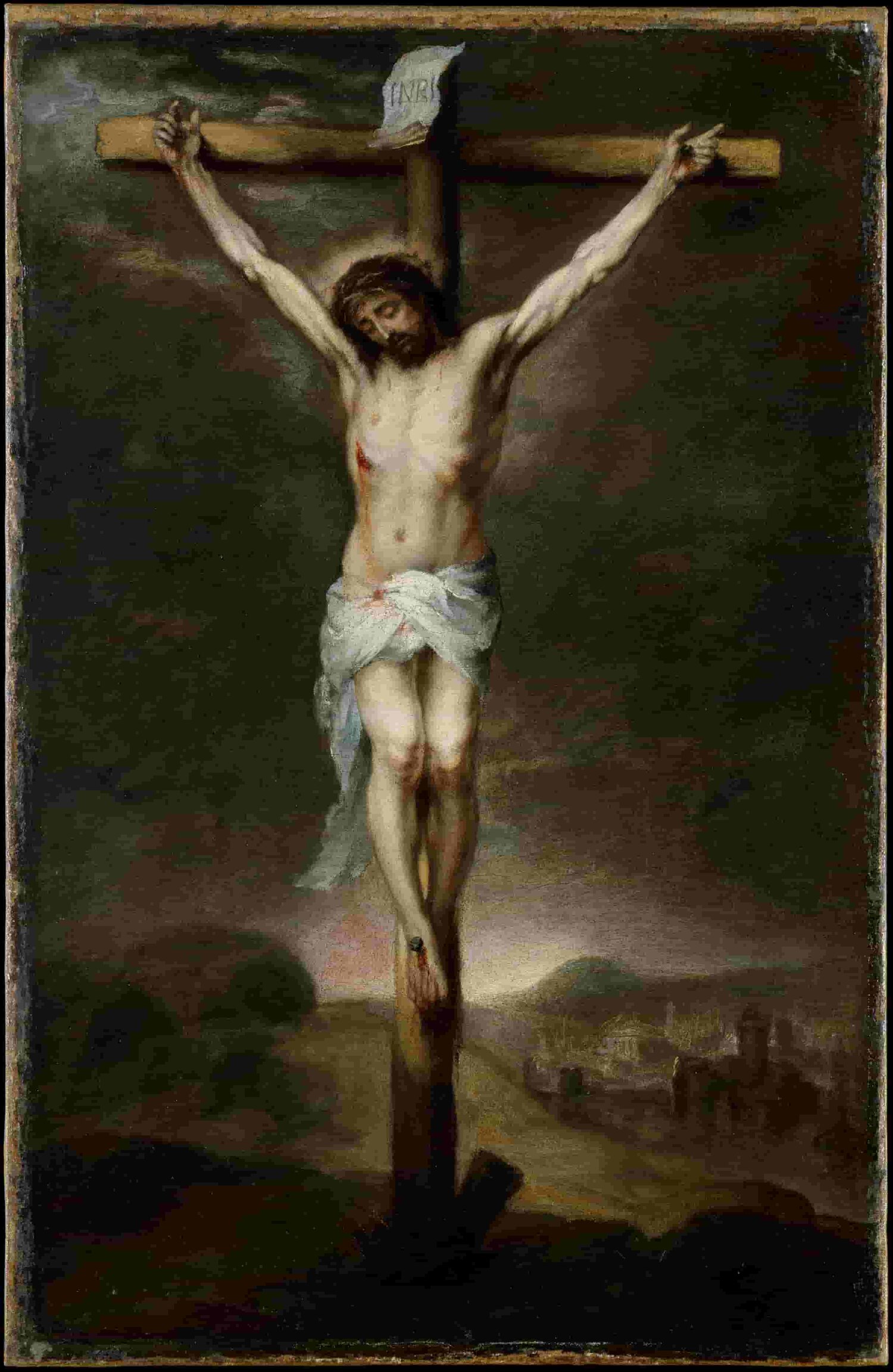
The implications of this were obvious. The Jewish Scriptures are very clear that the Messiah is a living, human king who rules the entire world in David's dynasty. Jesus certainly couldn’t do that if he was dead!
This was terribly depressing and discouraging for them. Not only was their very best friend humiliated and tortured to death. But even worse, the man they thought would conquer Israel’s enemies was actually killed by the enemies he was supposed to conquer!
Yet the story took a very shocking and surprising twist. Suddenly, they came to believe that Jesus was alive again. Their intense grief turned to joyous disbelief as they encountered their risen Lord, who had been killed just a couple days prior.
This is the exact opposite of how you are supposed to behave if your end times theory fails. We know this because of psychological research on cognitive dissonance. Historically, people make excuses when their doomsday theory fails. They don’t hallucinate it actually coming true. (1, 2, 3, 4)
For example, one cult thought God was going to destroy the world with a flood on a certain day. But when the date came and went, they used that as proof that God was merciful and decided to spare the globe such destruction. They did not hallucinate the flood actually happening! (1)
The same goes for the numerous predictions of Christ’s Second Coming. When the date comes and goes, the promoters of the idea come up with excuses for why it didn’t happen on the right day. However, none of these people ever has hallucinations of Jesus coming down from heaven in radiant glory. (2)
The most relevant example of this is that of the messianic movement surrounding Rabbi Menachem Mendel Schneerson in the mid-1990’s. Many Hasidic Jews believed that this man, called “the Rebbe,” was Israel’s promised Messiah. Yet despite this, he became seriously ill and died. But in the days after his death, some people celebrated, saying that he would soon rise from the dead. Even to this day, some still await his resurrection. (3, 4, 5)

Menachem Mendel Schneerson
The earliest followers of Jesus had plenty of opportunity to make excuses after Jesus died. They already believed that everyone was going to rise from the dead on the last day, because of what the Hebrew Scriptures said. Perhaps Jesus was the actual Messiah, but they would have to wait until the end times for him to rise from the dead and begin his glorious reign. (6)
However, the exact opposite happened. They did not have to explain away the fact that their eternal king was now dead. Nor did they have to patiently await his resurrection. On the contrary, they were pleasantly surprised that he was alive again, much earlier than expected! (7)
But why did they come to believe this so suddenly?
An early Christian missionary, named Paul, wrote letters to various churches about the crucified and risen Christ. He had personal contact with the closest followers of Jesus. As a result, he verified his gospel message with the eyewitnesses on at least two separate occasions.
When quoting a creed he received about the Gospel, he said:
For I delivered to you as of first importance what I also received: that Christ died for our sins in accordance with the Scriptures, that he was buried, that he was raised on the third day in accordance with the Scriptures, and that he appeared to Cephas, then to the twelve. Then he appeared to more than five hundred brothers at one time, most of whom are still alive, though some have fallen asleep. Then he appeared to James, then to all the apostles. Last of all, as to one untimely born, he appeared also to me. (1 Corinthians 15:3-8)
Notable non-Christian scholars think that this creed was created within 5 years of the death of Jesus. (8, 9) This is incredibly early material, especially since we are dealing with ancient history. Much of what we know about other ancient history comes from sources over 100 years after the fact. (8) Furthermore, since Paul verified his Gospel message with the eyewitnesses on at least two separate occasions, it's safe to say they agreed with this creed as well.
Jesus’ disciples had little incentive to lie about seeing him after he died. We know from history that the first Christians were very heavily persecuted. Many people will suffer and die for a religion they believe in. However, it’s quite implausible to say that the earliest Christians suffered persecution for a resurrection story that they made up themselves. This is why almost no scholar holds to the idea that the disciples made up the story. (10)
On the other hand, many people suggest that the disciples had grief hallucinations after he died. These are common experiences after someone has passed. However, they don't make very good sense of why the disciples saw Jesus, for several reasons.
First, the disciples did not expect Jesus to rise from the dead. If they saw a vision of him, they would have assumed that it was his ghost. Ironically, it would have been proof that Jesus was dead, not that he was alive. (11) Second, grief hallucinations don't account for the group appearances to the disciples. While one person might have a hallucination, a shared hallucination would be as unusual as sharing someone else's dream. (10) Finally, we've already seen one instance where people who anticipated someone's resurrection did not experience grief hallucinations. The followers of the Rebbe did not have hallucinations which they mistook for his resurrection. Instead, they experienced deep disappointment that he did not rise again.
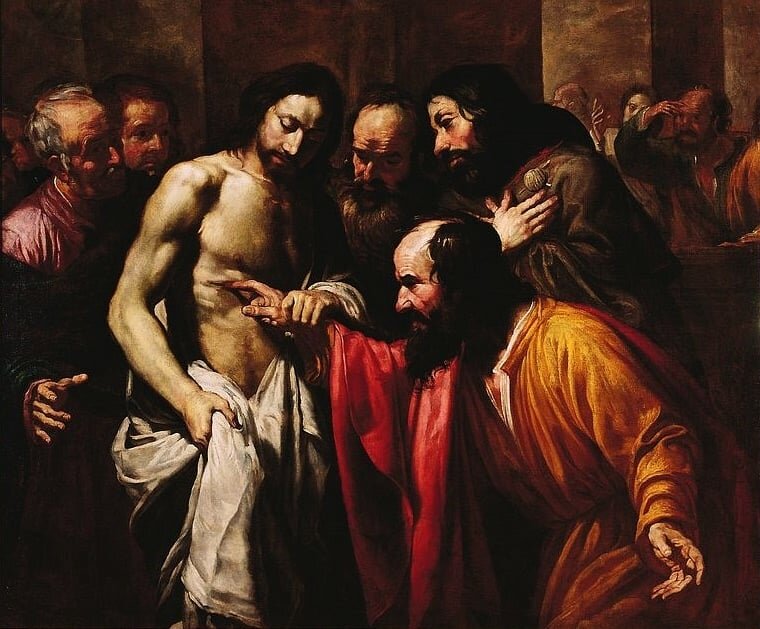
Doubting Thomas Sees Jesus
The Jewish Scriptures have some things to say about what it means to rise from the dead:
Your dead shall live; their bodies shall rise.
You who dwell in the dust, awake and sing for joy!
For your dew is a dew of light,
and the earth will give birth to the dead. (Isaiah 26:19)
And also:
And you shall know that I am the Lord, when I open your graves, and raise you from your graves, O my people. (Ezekiel 37:13)
The words that the earliest Christians used for resurrection means “to stand up” or “stand again.” (12) The Greek word for “raised” from the dead, is the same word used for when someone wakes up or stands up from sitting or sleeping. (13)
This shows that the disciples of Jesus meant a literal, bodily resurrection of Jesus' corpse. They were not claiming to have a vision of his ghost or any other kind of religious experience. They really believed that it was Jesus himself who appeared to them after his death.
This is why all four biographies of Jesus’ life report that his tomb was discovered empty after his resurrection. To make matters more interesting, these biographies report that women discovered the empty tomb. This is evidence that the stories are authentic. This would not be an embarrassing detail for us today. However, in that patriarchal society, the testimony of women was much less valuable. Their discovery of the empty tomb would even be considered detrimental or embarrassing to the credibility of the story. Therefore, we can conclude that the tomb really was empty. (14)
Jesus’ resurrection wasn’t just some magic trick to prove that he was the Messiah. It held great theological significance. In Jewish thought, everyone on earth would one day rise from the dead. As it says in the prophet Daniel:
And many of those who sleep in the dust of the earth shall awake, some to everlasting life, and some to shame and everlasting contempt. (Daniel 12:2)
The Messiah and end time resurrection of all humanity are rather disconnected ideas. For example, we don’t find these ideas connected very closely in the Jewish Scriptures. (15)
However, by rising from the dead, Jesus was actually inaugurating the end time resurrection of the dead. His resurrection was the launch event for the resurrection of all redeemed humanity. As a result, the earliest Christians called Jesus resurrection the “first fruits” of the resurrection of everyone else in history. Significantly, Jesus rose from the dead on the Jewish Feast of the First Fruits. (16)
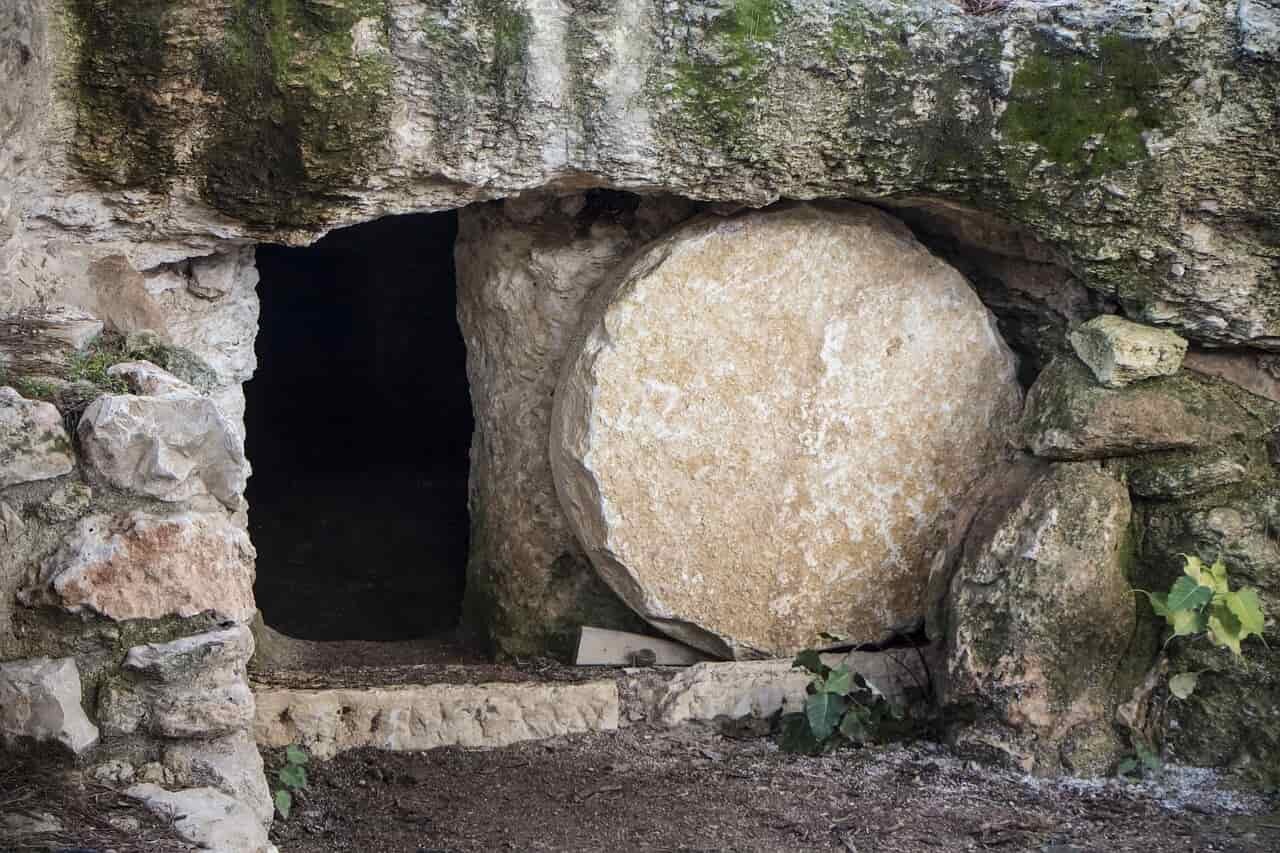
Indeed, Paul believed that Jesus himself was the one to carry out the end time resurrection of the dead. In a letter he wrote in the 50’s A.D. he describes Jesus as the one who will come from the sky and resurrect his dead followers. (1 Thessalonians 4:13-18)
This comes as no surprise, as the book of John records Jesus saying this very thing:
For this is the will of my Father, that everyone who looks on the Son and believes in him should have eternal life, and I will raise him up on the last day.” (John 6:40)
Jesus’ closest friends were obviously very confused by his death, since he was supposed to rule the world. But after he rose from the dead, it all finally made sense.
In the Hebrew Scriptures, the prophet Isaiah predicted a mysterious servant who would suffer on behalf of others. This person is “pierced” for the sins of other people, receiving punishment for their wrongdoing. As it says in Isaiah 53:
Surely he has borne our griefs
and carried our sorrows;
yet we esteemed him stricken,
smitten by God, and afflicted.
But he was pierced for our transgressions;
he was crushed for our iniquities;
upon him was the chastisement that brought us peace,
and with his wounds we are healed.
All we like sheep have gone astray;
we have turned—every one—to his own way;
and the Lord has laid on him
the iniquity of us all.
He was oppressed, and he was afflicted,
yet he opened not his mouth;
like a lamb that is led to the slaughter,
and like a sheep that before its shearers is silent,
so he opened not his mouth. (Isaiah 53:4-7)
This person is ultimately cut off from the land of the living, going to his “death.” As it says:
By oppression and judgment he was taken away;
and as for his generation, who considered
that he was cut off out of the land of the living,
stricken for the transgression of my people?
And they made his grave with the wicked
and with a rich man in his death,
although he had done no violence,
and there was no deceit in his mouth. (Isaiah 53: 8-9)
However, despite dying, this servant will live on. He will “prolong his days” and will “divide the spoil with the strong.”
Yet it was the will of the Lord to crush him;
he has put him to grief;
when his soul makes an offering for guilt,
he shall see his offspring; he shall prolong his days;
the will of the Lord shall prosper in his hand.
Out of the anguish of his soul he shall see and be satisfied;
by his knowledge shall the righteous one, my servant,
make many to be accounted righteous,
and he shall bear their iniquities.
Therefore I will divide him a portion with the many,
and he shall divide the spoil with the strong,
because he poured out his soul to death
and was numbered with the transgressors;
yet he bore the sin of many,
and makes intercession for the transgressors. (Isaiah 53:10-12)
The first five books of the Bible, called the Torah, give many instructions about how the Jewish people were to offer sacrifices, to be forgiven for their sins. But here, Isaiah uses the language of sacrifice to describe what the servant does, saying that he makes an “offering for guilt.”
Another major sacrifice was the Passover sacrifice. When the Jews were slaves in Egypt, God punished the Egyptians through a series of ten plagues. The last, and most serious plague, was the slaying of the first born of everyone in Egypt. However, God “passed over” the homes of everyone that put the blood of the Passover lamb on the doorposts. In this way, God spared his people the fate that was to befall the firstborn in every Egyptian family. (Exodus 12)

Passover Lamb
However, just as Jesus rose on the Feast of the First Fruits, he was executed the day after eating the Passover meal with his disciples. (17) In this way, Jesus functioned as the ultimate Passover Lamb. Just as the Israelites escaped death through the blood of the Passover Lamb, those who trust in Jesus can escape the penalty for sin, which is death. (Romans 6:23)
To summarize, Isaiah 53 describes a man who suffers for the sins of others, dies, and yet lives on. Yet the only way he could live on after dying would be by resurrecting. Therefore, the resurrection of Jesus not only guarantees the resurrection of all God’s people. It also proves that he really did fulfill Isaiah 53, and that God accepted the sacrifice for sin.
However, Jesus’ followers did something quite strange when they saw him resurrected. They worshiped him. This is especially weird, since they were devout Jews who only believed in one God.
However, Jewish Scriptures talk about how the Messiah, though a human born of a woman, is also God:
For to us a child is born,
to us a son is given;
and the government shall be upon his shoulder,
and his name shall be called
Wonderful Counselor, Mighty God,
Everlasting Father, Prince of Peace.
Of the increase of his government and of peace
there will be no end,
on the throne of David and over his kingdom,
to establish it and to uphold it
with justice and with righteousness
from this time forth and forevermore.
The zeal of the Lord of hosts will do this. (Isaiah 9:6-7)
In Psalms it says:
Your throne, O God, is forever and ever.
The scepter of your kingdom is a scepter of uprightness;
you have loved righteousness and hated wickedness.
Therefore God, your God, has anointed you
with the oil of gladness beyond your companions; (Psalm 45:6-7)
This last passage talks about a king called God, who is also anointed by God. But how can this be, since God is one? After all, Isaiah says:
Declare and present your case;
let them take counsel together!
Who told this long ago?
Who declared it of old?
Was it not I, the Lord?
And there is no other god besides me,
a righteous God and a Savior;
there is none besides me.
“Turn to me and be saved,
all the ends of the earth!
For I am God, and there is no other. (Isaiah 45:21-22)
This shows that God is one entity, yet more than one person. Indeed, Isaiah himself even speaks of the plurality within the Godhead:
Thus says the Lord, the King of Israel
and his Redeemer, the Lord of hosts:
“I am the first and I am the last;
besides me there is no god. (Isaiah 44:6)
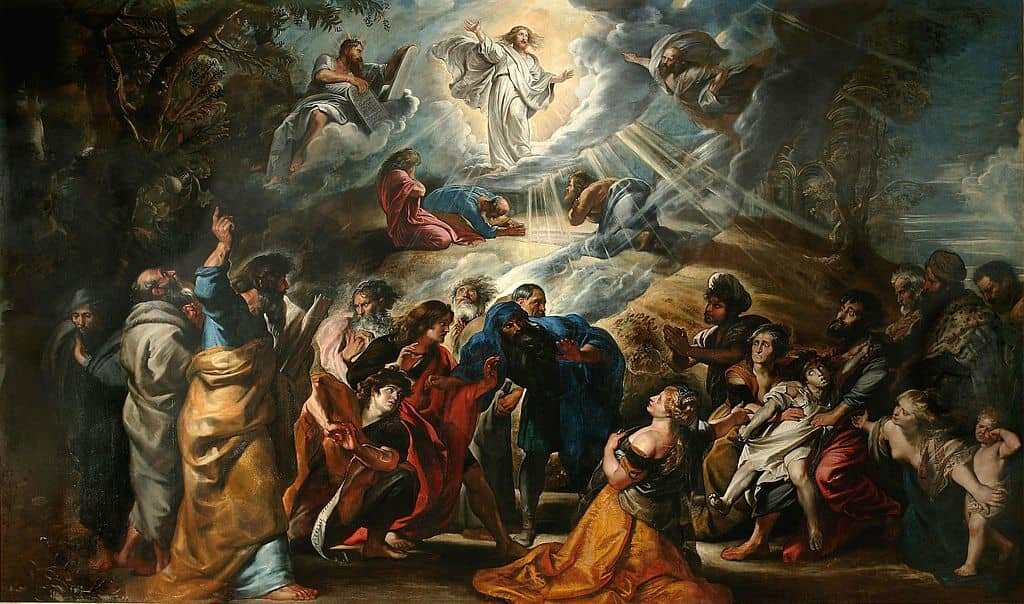
The Transfiguration
Jesus’ original disciples didn’t realize this at first. Yet very early on, the Christians started calling Jesus “Lord” (Greek: kurios). Interestingly, “kurios” was the word that Greek speaking Jews used for “Yahweh,” when reading the Jewish Scriptures out loud. Furthermore, when quoting the Hebrew Bible in Greek, Paul routinely used the word “Kurios” in place of “Yahweh,” which is God’s very name. Remarkably, the first Christians quoted Bible verses about the Lord (Yahweh), and applied them to Jesus. (18)
For example, Isaiah 45 says:
Declare and present your case;
let them take counsel together!
Who told this long ago?
Who declared it of old?
Was it not I, the Lord?
And there is no other god besides me,
a righteous God and a Savior;
there is none besides me.
“Turn to me and be saved,
all the ends of the earth!
For I am God, and there is no other.
By myself I have sworn;
from my mouth has gone out in righteousness
a word that shall not return:
‘To me every knee shall bow,
every tongue shall swear allegiance.’ (Isaiah 45: 21-23)
But Paul takes this passage about Yahweh (the Lord) and makes it about Jesus. He quotes an early Christian song, which says:
who, though he was in the form of God, did not count equality with God a thing to be grasped, but emptied himself, by taking the form of a servant, being born in the likeness of men. And being found in human form, he humbled himself by becoming obedient to the point of death, even death on a cross. Therefore God has highly exalted him and bestowed on him the name that is above every name, so that at the name of Jesus every knee should bow, in heaven and on earth and under the earth, and every tongue confess that Jesus Christ is Lord, to the glory of God the Father. (Philippians 2:6-11)
In the Isaiah passage, every knee will bow to the Lord. However, this song says that every knee will bow at the name of Jesus, whom Paul calls “Lord” (Kurios).

The Apostle Paul
Elsewhere, Paul gives the requirements for salvation, saying:
because, if you confess with your mouth that Jesus is Lord and believe in your heart that God raised him from the dead, you will be saved. 10 For with the heart one believes and is justified, and with the mouth one confesses and is saved. For the Scripture says, “Everyone who believes in him will not be put to shame.” For there is no distinction between Jew and Greek; for the same Lord is Lord of all, bestowing his riches on all who call on him. For “everyone who calls on the name of the Lord will be saved.” (Romans 10:9-13)
Here, those who want to be saved must confess Jesus as “Lord.” But what does Paul mean by this? To prove his point, Paul alludes to a verse in Isaiah, which says that everyone who calls on the name of “the Lord” (Hebrew: Yahweh) will be saved. Here he is equating Jesus with Yahweh.
There are numerous other passages where the early Christians took passages about the Lord God, and said they were about Jesus. But what does this prove?
The Hebrew Bible teaches that the Messiah would be God. However, the disciples of Jesus may not have realized that Jesus was God until very late in his ministry (John 14:8-11). But what would cause such fiercely monotheistic Jews to suddenly believe that Jesus was God? The most likely explanation is that he claimed it. Jesus made numerous claims to deity, in public and private.
Here, Jesus says that to see him is to see God:
Philip said to him, “Lord, show us the Father, and it is enough for us.” Jesus said to him, “Have I been with you so long, and you still do not know me, Philip? Whoever has seen me has seen the Father. How can you say, ‘Show us the Father’? (John 14:8-9)
Yet in another instance, Jesus claims to be one with the Father:
I and the Father are one. (John 10:30)
His contemporaries understood completely, as they tried to stone him for blasphemy after saying this.
Yet elsewhere, Jesus calls himself "I am."
Jesus said to them, “Truly, truly, I say to you, before Abraham was, I am.” (John 8:58)
So also here, the Jews tried to stone him for blasphemy. But why? There are two possible reasons. One explanation is that he was using the name of God on himself, which God revealed in the burning bush to Moses.(Exodus 3:14) Others say it is a reference to what God calls himself in Isaiah 43. In either case, his audience understood his message loud and clear.
Therefore, the resurrection not only proves that Jesus is the rightful king of planet earth. It also proves that Jesus is both God and man.
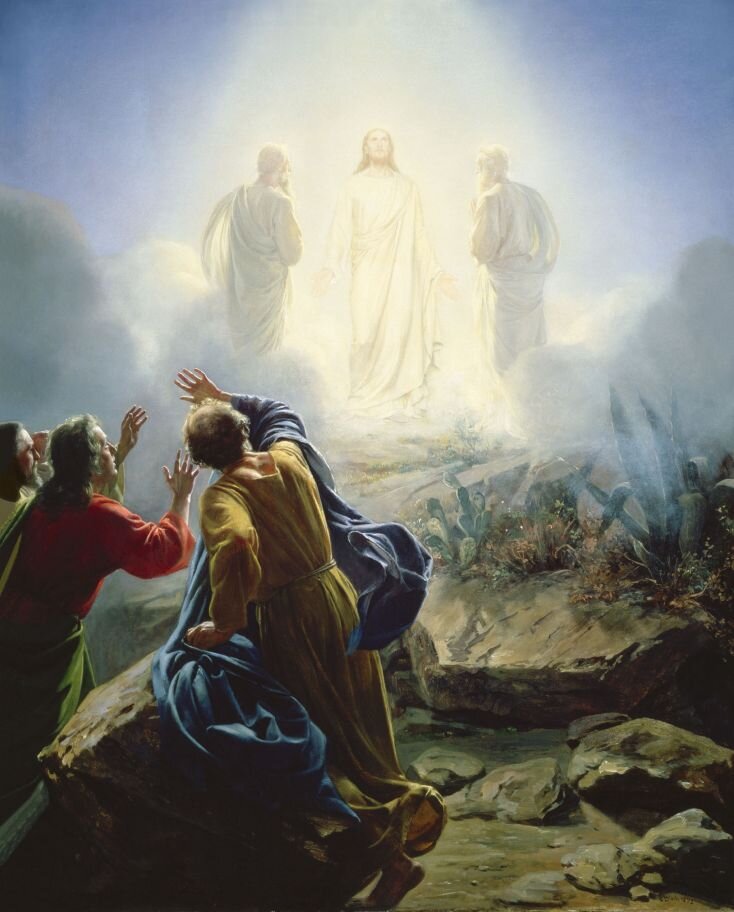
The Transfiguration
When Jesus returns to rule planet earth, it will be the greatest time of prosperity and peace that the world has ever known. As it says in Isaiah 11:
There shall come forth a shoot from the stump of Jesse,
and a branch from his roots shall bear fruit.
And the Spirit of the Lord shall rest upon him,
the Spirit of wisdom and understanding,
the Spirit of counsel and might,
the Spirit of knowledge and the fear of the Lord.
And his delight shall be in the fear of the Lord.
He shall not judge by what his eyes see,
or decide disputes by what his ears hear,
but with righteousness he shall judge the poor,
and decide with equity for the meek of the earth;
and he shall strike the earth with the rod of his mouth,
and with the breath of his lips he shall kill the wicked.
Righteousness shall be the belt of his waist,
and faithfulness the belt of his loins.
The wolf shall dwell with the lamb,
and the leopard shall lie down with the young goat,
and the calf and the lion and the fattened calf together;
and a little child shall lead them.
The cow and the bear shall graze;
their young shall lie down together;
and the lion shall eat straw like the ox.
The nursing child shall play over the hole of the cobra,
and the weaned child shall put his hand on the adder's den.
They shall not hurt or destroy
in all my holy mountain;
for the earth shall be full of the knowledge of the Lord
as the waters cover the sea. (Isaiah 11:1-9)
Yet when he comes, it won't all be rainbows and roses. When he first arrives, he will come in judgment:
“For behold, the Lord will come in fire,
and his chariots like the whirlwind,
to render his anger in fury,
and his rebuke with flames of fire.
For by fire will the Lord enter into judgment,
and by his sword, with all flesh;
and those slain by the Lord shall be many. (Isaiah 66:15-16)

God is rightfully angry about all of the evil in the world. Furthermore, we don't even live up to our own standards of morality, much less God's. As Paul says in his letter to the church in Rome:
Therefore you have no excuse, O man, every one of you who judges. For in passing judgment on another you condemn yourself, because you, the judge, practice the very same things. (Romans 2:1)
Furthermore, God sees all of our hidden motives.
They show that the work of the law is written on their hearts, while their conscience also bears witness, and their conflicting thoughts accuse or even excuse them on that day when, according to my gospel, God judges the secrets of men by Christ Jesus. (Romans 2:15-16)
Nor can anyone say that they are righteous before God. The book of Deuteronomy pronounces curses on Israelites who do not do all the things commanded in the law.
“But if you will not obey the voice of the Lord your God or be careful to do all his commandments and his statutes that I command you today, then all these curses shall come upon you and overtake you.(Deuteronomy 28:15)
King David also says:
God looks down from heaven
on the children of man
to see if there are any who understand,
who seek after God.
3 They have all fallen away;
together they have become corrupt;
there is none who does good,
not even one. (Psalm 53:2-3)
God is a completely impartial Judge. (Romans 2:11) If he did show partiality, he would be a bad judge. Therefore, he can’t simply let us off the hook for all the evil things we have done in our past. As a result, justice must be done, one way or another. But in the death of Jesus, the judge himself takes the penalty for our crimes, instead of punishing us. This enables him to be just when forgiving those who trust in him.
As Jesus says elsewhere:
For the Father judges no one, but has given all judgment to the Son, that all may honor the Son, just as they honor the Father. Whoever does not honor the Son does not honor the Father who sent him. Truly, truly, I say to you, whoever hears my word and believes him who sent me has eternal life. He does not come into judgment, but has passed from death to life. (John 5:22-24)
One day God will judge the world for all of its sins. The name of that Judge is Jesus. However, those who put their trust in Jesus will not be judged.
So here are the facts. Jesus died to pay the penalty for our sin. He rose from the dead. He is truly God and truly man. He will return to judge and rule the whole world. Yet everyone who believes in him is not judged for their sins, but has eternal life instead.
Now if those are the facts, then what are you going to do about it?

Jesus Appears to Mary Magdalene
Learn more about the Resurrection here:
Michael Licona
Gary Habermas
William Lane Craig
NT Wright
References:
- “When Prophecy Fails.” Wikipedia. Wikimedia Foundation, March 24, 2020. https://en.wikipedia.org/wiki/When_Prophecy_Fails.
- Heflick, Nathan. “End of the World? Cognitive Dissonance and Harold Camping.” Psychology Today. Sussex Publishers, May 24, 2011. https://www.psychologytoday.com/us/blog/the-big-questions/201105/end-the-world-cognitive-dissonance-and-harold-camping.
- Heilman, Samuel. “The Chabad Rebbe Died 25 Years Ago. Here's How His Movement Has Survived.” Jewish Telegraphic Agency, July 8, 2019. https://www.jta.org/2019/07/05/opinion/the-chabad-rebbe-died-25-years-ago-heres-how-his-movement-has-survived.
- Komarnitsky, Kris. “Cognitive Dissonance and the Resurrection of Jesus.” Westar Institute, 2014. https://www.westarinstitute.org/resources/the-fourth-r/cognitive-dissonance-resurrection-jesus/#notes.
- “Chabad Messianism.” Wikipedia. Wikimedia Foundation, April 6, 2020. https://en.wikipedia.org/wiki/Chabad_messianism.
- Craig, William Lane. “The Resurrection of Jesus: Reasonable Faith.” The Resurrection | Popular Writings | Reasonable Faith. Accessed April 10, 2020. https://www.reasonablefaith.org/writings/popular-writings/jesus-of-nazareth/the-resurrection-of-jesus/.
- Wright, N T. “Christian Origins and the Resurrection of Jesus: The Resurrection of Jesus as a Historical Problem.” NTWrightPage, 1998. https://ntwrightpage.com/2016/07/12/christian-origins-and-the-resurrection-of-jesus-the-resurrection-of-jesus-as-a-historical-problem/.
- Habermas, Gary. “Gary Habermas at Purdue.” Youtube.com, August 16, 2017. https://www.youtube.com/watch?v=3oLAei0h2v8.
- Habermas, Gary. “The Resurrection Argument That Changed a Generation of Scholars - Gary Habermas at UCSB.” Youtube.com, November 8, 2012. https://www.youtube.com/watch?v=ay_Db4RwZ_M.
- Licona, Michael R. The Resurrection of Jesus: a New Historiographical Approach. Downers Grove, Ill: InterVarsity Press, 2011.
- Wright, Nicholas Thomas. The Resurrection of the Son of God. Minneapolis: Fortress Pr., 2004.
- “Strong's Greek: 386. Ἀνάστασις (Anastasis) -- a Standing up, I.e. a Resurrection, a Raising up, Rising.” Biblehub.com. Accessed April 10, 2020. https://biblehub.com/greek/386.htm.
- “Strong's Greek: 1453. Ἐγείρω (Egeiró) -- to Waken, to Raise Up.” Biblehub.com. Accessed April 10, 2020. https://biblehub.com/str/greek/1453.htm.
- Craig, William Lane. “The Historicity of the Empty Tomb of Jesus: Reasonable Faith.” Historicity of the Empty Tomb of Jesus | Reasonable Faith. Accessed April 11, 2020. https://www.reasonablefaith.org/writings/scholarly-writings/historical-jesus/the-historicity-of-the-empty-tomb-of-jesus/.
- Craig, William Lane. “Jesus' Resurrection: Reasonable Faith.” Reasonable Faith. Accessed April 10, 2020. https://www.reasonablefaith.org/writings/scholarly-writings/historical-jesus/jesus-resurrection/.
- GotQuestions.org. “How Did Jesus Fulfill the Meanings of the Jewish Feasts?” GotQuestions.org, March 1, 2006. https://www.gotquestions.org/Jewish-feasts.html.
- GotQuestions.org. “If Jesus Was Crucified on the Day of Preparation, Why Had He Already Eaten the Passover Meal?” GotQuestions.org, April 4, 2016. https://www.gotquestions.org/Day-of-Preparation.html.
- Hurtado, Larry W. Lord Jesus Christ: Devotion to Jesus in Earliest Christianity. Grand Rapids, MI: Eerdmans, 2005.
- Scripture quotations are from the English Standard Version of the Bible.
Photo Credits:
World sunrise
Jesus on the cross
Rabbi Mendel Schneerson
Doubting Thomas
Empty tomb
Passover lamb
Transfiguration 1
Paul writing
Transfiguration 2
Fire
Jesus and Mary
